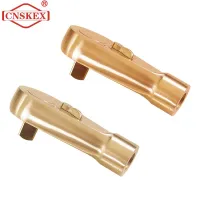10 Most frequently asked questions about Non-Sparking Tools
Q1: What is the meaning of non-sparking?
A1: Non-sparking refers to the property of materials or tools that minimizes the generation of sparks, reducing the risk of fire or explosions in environments where flammable gases, liquids, or dust are present.
Q2: What are non-sparking tools?
A2: Non-sparking tools are designed from materials that do not produce sparks during operation. These tools are crucial in industries where the presence of combustible materials poses a significant safety risk.
A3: Yes, bronze is a common non-sparking material. Tools made from aluminum bronze or beryllium copper alloys exhibit non-sparking properties and are widely used in various industrial applications.
Q4: Who should use tools that are non-sparking?
A4: Individuals working in industries such as oil and gas, chemical, pharmaceuticals, and mining, where the potential for flammable substances exists, should use non-sparking tools.
Q5: Why use non-sparking tools?
A5: Non-sparking tools are used to prevent the ignition of flammable atmospheres, ensuring the safety of both workers and the surrounding environment in hazardous workplaces.

Q6: What factors contribute to a metal being non-sparking?
A6: The non-sparking property is primarily determined by the low hardness and conductivity of the material. Alloys like bronze and copper beryllium possess these characteristics, reducing the likelihood of sparking.
Q7: Why are non-sparking tools considered safety tools?
A7: Non-sparking tools prevent the occurrence of sparks that could ignite flammable materials, mitigating the risk of fires and explosions. Their use is a crucial safety measure in potentially hazardous work environments.
Q8: What is the correct way to use non-sparking tools?
A8: Users should ensure proper maintenance and inspection of non-sparking tools. Avoid using damaged tools, and follow recommended operating procedures to maximize safety in volatile environments.
Q9: Can we use non-sparking tools for electrical equipment maintenance?
A9: Non-sparking tools are not specifically designed for electrical work. While they reduce the risk of sparking, tools with insulated handles are more suitable for electrical equipment maintenance to ensure complete safety.
Q10: How to Choose a Non-Sparking tool?
A10: When choosing a non-sparking tool, consider the specific application, material compatibility, and the tool's construction. Opt for tools made from approved non-sparking alloys, and ensure they meet industry safety standards.
In conclusion, non-sparking tools play a crucial role in maintaining safety in environments where the potential for fire or explosions exists. Understanding their properties, correct usage, and proper selection contribute to creating a secure working environment for individuals in high-risk industries.


